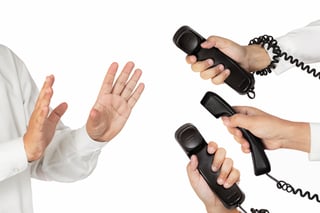 The Automatic Stay in Chapter 7 Bankruptcy is an invisible wall that keeps your creditors from collecting against you during the pendency of the bankruptcy. In rare circumstances, creditors are able to navigate the automatic stay and still act on the debts that you owe. Most of the time, creditors cease collection action once a debtor has filed bankruptcy. In this blog, we address what the automatic stay, what the automatic stay isn’t, and the benefits debtors receive once their bankruptcy has been filed.
The Automatic Stay in Chapter 7 Bankruptcy is an invisible wall that keeps your creditors from collecting against you during the pendency of the bankruptcy. In rare circumstances, creditors are able to navigate the automatic stay and still act on the debts that you owe. Most of the time, creditors cease collection action once a debtor has filed bankruptcy. In this blog, we address what the automatic stay, what the automatic stay isn’t, and the benefits debtors receive once their bankruptcy has been filed.
Most everyone has a fear of the unknown, which is one of the biggest reasons why people are afraid to file bankruptcy. In addition to this, society has placed a terrible stigma on bankruptcy which simply isn’t true. Upon filing bankruptcy, our clients are immediately greeted with the feeling of relief. This relief is, in part, due to the benefits provided by the automatic stay.
The Automatic Stay is a provision in the Federal Bankruptcy Code which acts as an injunction preventing creditors from collecting on debts owed by anyone who declares bankruptcy. What this means is, creditors are not allowed to continue any type of collection activity. If you’re experiencing the stress of delinquent accounts, you are familiar with some of the most common collection activities: phone calls, letters, and e-mails. All of the creditors efforts to collect must come to a halt. This applies to both unsecured and secured debts (credit cards, medical bills, past due mortgage payments, past due car payments, etc.).
Past Due on Vehicle Payments or your Mortgage?
One of the most beneficial aspects of the automatic stay is the provisions ability to prevent creditors from foreclosing or repossessing certain types of property. For instance, if you’re severely delinquent on your vehicle payments, it is likely you’re staring a repossession head on. Well, if you file bankruptcy prior to the repossession taking place, the automatic stay will prevent the bank from taking the vehicle back until your bankruptcy is finalized. Likewise, if you’re severely delinquent on your mortgage payments, the automatic stay can help. Once your bankruptcy is filed, the automatic stay will protect your home from being immediately foreclosed against. We have many clients who successfully file bankruptcy before their house is sold at auction. This provides homeowners with extra time to decide what exactly needs to be done with their house.
Utilities
Sometimes we will get clients who are concerned about their past due utilities. Bankruptcy can help you with this as well. If you’re in fear of having your utilities shut off, bankruptcy can prevent this. There is one caveat, however. Once you file bankruptcy, your utility provider is allowed to request “reasonable assurance” you will pay future bills. Often, reasonable assurance comes in the form of a security deposit. The amount of the deposit will vary, but is typically reflective of your monthly bill.
Eviction
There is often misconception regarding eviction notices. Before a landlord can evict a tenant, a landlord must have court permission. If you file bankruptcy before a landlord receives court permission to evict, the automatic stay will protect you from the eviction. However, if the landlord has already received authorization from court to evict, it is too late for the bankruptcy to provide protection. When it comes to potential eviction, it is always best to err on the side of caution and be proactive in seeking a bankruptcy consultation.
Wage Garnishment
If you are currently being garnished for a past due debt, you understand how much of an impact this can have on your income. Creditors are authorized to take up to 25% of your gross earnings through garnishment with court approval. Creditors are notorious for taking the 25%. There are exceptions to this, however. Certain creditors (government agencies, etc.) are permitted to take more than 25%. Either way, garnishments can be ugly. The automatic stay can protect you from most garnishments. As soon as your bankruptcy case is filed, certain creditors are required by law to cease future garnishments. This is one of the main reasons why we have people seeking the assistance of a Bankruptcy Attorney. If you are being garnished, or fear this will happen soon, contact a MN Bankruptcy Attorney and see what we can do for you.
What the Automatic Stay Can’t Do
There are certain debts the Automatic Stay in Chapter 7 cannot prevent the collection on. Most often, these debts are the type of debts sought after by a government entity. Child support, criminal fines, and certain tax debts can still be collected on despite the filing of bankruptcy. Be sure to consult a MN Bankruptcy Attorney about your specific situation if you’re concerned about one of these types of debts.
Lifting the Automatic Stay
In very few circumstances, creditors may get court permission to continue collecting on certain debts. This is referred to as “lifting” the automatic stay. Before a creditor can collect against you, creditors must seek court permission to lift the automatic stay. If granted, creditors will be able to move forward in the collection process. We typically see this when someone is severely delinquent on their house and they have no apparent means of making up the missed payments in months to come. If you’re concerned this may affect you, give one of our MN Bankruptcy Attorneys a call and we can give you the guidance you need.
Conclusion
The Automatic Stay in Chapter 7 Bankruptcy is a powerful injunction provided by bankruptcy laws. If you’re tired of creditors garnishing your wages or you are concerned about what the creditors may do next, give us a call and meet with us. We can schedule appointments to meet over the phone, in person, via Skype, or even FaceTime. We look forward to helping you navigate the financial struggles in front of you. If you’re ready to get your life back, we would be honored to help you. Our staff will never judge you for what you’re going through.


